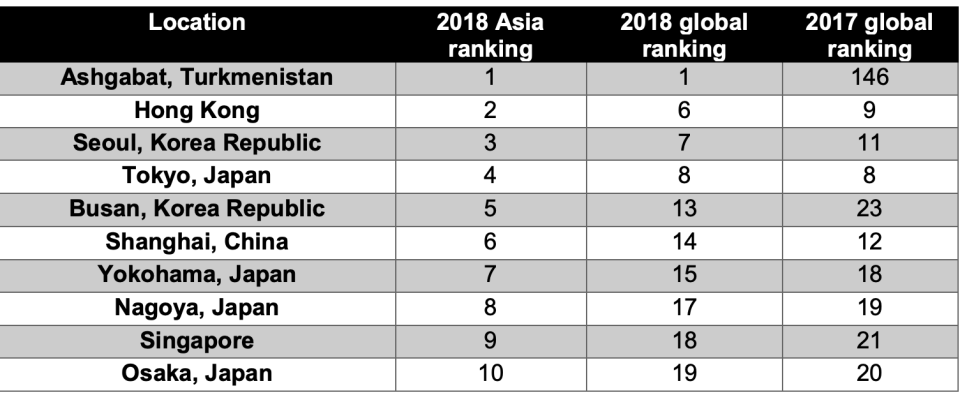Singapore is 18th most expensive location in the world for expats: survey

Singapore is the 18th most expensive location in the world for expatriates, and the ninth most costly in the Asia Pacific region, due partly to the strong Singapore dollar, according to a survey by ECA International.
“The Singapore dollar has performed strongly this year, resulting in a slight rise in Singapore’s rankings, up 3 places to become the 18th most expensive location in the world,” said Lee Quane, Regional Director, Asia for ECA International, in a statement on Monday (17 December).
Last year, Singapore was the 21st most expensive city in the world for expatriates, down from 16th in 2016, according to the survey. Its 9th position within Asia has remained unchanged since 2016.

Ashgabat, the capital city of the Central Asian nation of Turkmenistan, is the most expensive city in Asia and in the world for expats, ECA International said. It jumped from 146th in 2017 to the top spot amid a deepening economic crisis.
“A plunging black market exchange rate and foreign exchange shortages have stoked levels of inflation in Turkmenistan and have led the prices of goods to increase significantly over the past 12 months,” Quane said. “A shortage of goods and hard currency means that it is now much more expensive for expatriate workers in Ashgabat to purchase the items and services that they normally would.”
Hong Kong is the second most expensive location in Asia for expat workers to live in, and the sixth most expensive in the world. Seoul ranked the third most costly in Asia and the seventh most expensive globally, followed by Tokyo ranking fourth in Asia and eighth in the world.
“2018 was another strong year for the Hong Kong dollar, resulting in Hong Kong’s rise from ninth place last year to sixth, leapfrogging locations such as Tokyo and Oslo where the currencies have been slightly weaker,” Quane said.
Thai cities were among the biggest risers in the rankings, with Bangkok rising 32 places and entering the top 100 most expensive locations for the first time in 90th place. The Thai baht has strengthened in recent years due to improvement in economic and political conditions in the country, thus making it more expensive for foreign workers to live in, according to Quane.
In mainland China, all 14 Chinese cities surveyed by ECA remain in the global top 50, with Shanghai leading the way as the 14th most expensive location globally, and the sixth in Asia after Busan.
ECA International said that its twice-yearly survey is to help companies calculate cost of living allowances so that their employees’ spending power is not compromised while on international assignments.
The surveys compare a basket of like-for-like consumer goods and services commonly purchased by assignees in over 450 locations worldwide. Certain living costs, such as accommodation rental, utilities, car purchases and school fees are usually covered by separate allowances. Data for these costs are collected separately and aren’t included in ECA’s cost of living basket.
Related stories:
Singapore core inflation rises to 1.9 per cent in October
Singapore economy to grow 3.3% this year
Singapore November private home sales rise 52% from year ago

 Yahoo Finance
Yahoo Finance 
